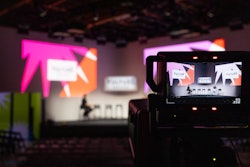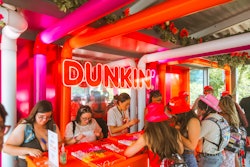
It's no question 2024 marks an interesting era for events. We're years out from the restrictions of the COVID-19 pandemic but its effects are still lingering; we're (maybe) getting the hang of early AI tech; and we're also in the midst of a presidential election year. So it's also no question that event profs today are navigating a complex landscape filled with unique challenges that demand creativity and adaptability.
We wanted to check in with readers on what's currently keeping them up at night, and during Connect Marketplace in Milwaukee last week (Connect is BizBash's parent company), we sat down with a handful of event profs to see how they'd all answer this question: What's your biggest challenge today as an event prof? Read their answers below.
Brittney Cobb, director of global events, INNOV8 Meetings + Events, Boise, Idaho
"I think our industry as a whole is doing phenomenally—I don't think, I know we are. There are a lot of positives. Labor and jobs in our industry are up. Our luxury market is soaring. But those things also bring challenges. I think one of the top things is supply and demand. It's obviously positive that demand is through the roof. But on the flip side, the supply that we have to meet that demand is struggling. I think once interest rates start to drop, we'll see an uptick in investors and companies being able to start building more hotels that have meeting space that can help meet the demand. We're not going to see those pop up overnight, so it's still going to be a couple of years that we're faced with that challenge.
We need to have conversations and have our stakeholders understand the reality of our market, pricing being one. Inflation has impacted everybody on a personal level individually to every company out there. But our stakeholders need to understand that the prices aren't going to drop to what we once knew them to be. Labor is at an all-time high for hotels, and that's hotels' highest cost. From a planner's perspective, we need to understand all of these different aspects to then be able to have the conversation effectively with our clients on why things are the way they are. We also need to help them get creative and look at different ways that we can negotiate savings to offset some of these other costs that aren't going to change."
Jessica Montefusco, chief experience officer, Wicked Experience Design, Houston
"I think, for me, the biggest issue is still availability of housing and hotels. A lot of my clients were booking six months out. Now, it's like, 'OK, even for your 30-person program, we need to get that booked like yesterday.' So we're booking, at minimum, a year out for all of those programs, big or small. On top of that, it's the different things that hotels are doing with their AV costs and things like that. It's really the price of things increasing and budgets decreasing, but demand getting higher."
Sarah Meister, event housing expert and founder and CEO, SM Event Co, Greenville, S.C.
"I think one of the biggest things right now is rates. Post-COVID, we've seen hotels trying to recoup lost revenue. There's no question that events are back. It's a hotelier's market right now, and they're leaning into that. And I would say the second thing is a lot less flexible contractual terms. There are a lot of new things that are being added into contracts. Very recently, I've seen 'no changes post cutoff.' Of course you're going have changes post cutoff. That's a really common one that's been popping up. Prepaying attrition fees before the event even takes place is another one. Those are two that really infuriate me that I've never seen before the last 12 months."
Lynn Hochrine, senior program manager of events and recognition, REI, Tacoma, Wash.
"There are many corporate planners who are dealing with a lot of change management right now. When I say change management, I mean it broadly, like companies merging, being acquired, and having leadership changes. Post-pandemic, we have an interesting marketplace, and I think things are reacting as such. Starbucks has a new CEO. We've had some C-suite leadership changes. Petco has a new CEO. There are a lot of changes on a larger volume, and that invariably has influence on where we gather, how we gather, and what the strategy is.
From an internal events perspective, I think we're also seeing companies that were not fully remote or mobile prior to the pandemic. There's a ton of value and appreciation for remote work, and some people wouldn't want to go back. I think we have yet to crack the code on how you maintain—especially in this broader environment of challenging and uncertain times for some—culture and connection, and how you connect people to one another and to the brand, especially when you're talking about events. I don't think things are broken, but I do think companies are wrestling with this.
I also think that, today, there are very few corporate planners who will say, 'I'm totally well ahead on my timeline.' For most corporate planners, even if they have some things foundationally planned like I do with my recognition programs, there are other things that pop up. I've heard from peers that current lead times are even more compressed. My hypothesis is that the marketplace is unusual right now—it's also an election year—and a lot of people are experiencing change management."
Tara Drewes, founder and CEO, I-MET Management, Windermere, Fla.
"The biggest challenge is balancing budget constraints with the demand for high-impact experiences. Clients are looking for unique and memorable events, but economic pressures require creative solutions to deliver value without overspending."
David Twigger, creative director and founder, Vermilion Events, Phoenix
"Staffing is still an issue I think. Events went full out after the pandemic, which was great, but I think many organizations are having issues with staffing whether it's hotels, CVBs, or convention centers. They're having issues getting fully staffed again with people who are experienced."
Julie Knowles, director of client services, Elevoque, Chicago
"I do think it's timelines. We were just in one of the education sessions [at Connect Marketplace], and the speaker mentioned that pre-COVID to now, the timelines have shifted and shrunk so much. We have a huge program that we're planning for this October for 600 people. I think the first hotel contract was just signed today, and we're a month and a half from the program. Thankfully, because Chicago has so many hotels, we were able to find a fantastic hotel partner that could accommodate the group size. We have an overflow hotel too. I think our venues and our restaurants are used to it as well, because they still have availability. And so we're working on meeting spaces for them in and outside the hotel, off-sites, and a lot of dine-arounds. So it's just seeing who's still available, because October in Chicago is also a very popular time."



















